My African Safari in Kenya during Covid-19 By Lisa Spiller
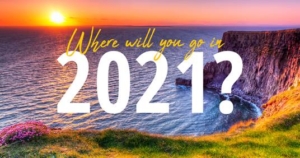 While many people were online shopping and decorating for the holidays this year, I accepted an extraordinary invitation to go on an African Safari for 10 glorious days in December, 2020. This, at a time when many people were hesitant to travel due to the 2020 global Covid-19 pandemic, and some even asked “Is Africa even open? Why travel to Africa?”
While many people were online shopping and decorating for the holidays this year, I accepted an extraordinary invitation to go on an African Safari for 10 glorious days in December, 2020. This, at a time when many people were hesitant to travel due to the 2020 global Covid-19 pandemic, and some even asked “Is Africa even open? Why travel to Africa?”
Whether seeking luxury or glamping, adventure or pampering, breathtaking natural landscapes, unforgettable wildlife encounters, new cultural experiences and insights, extraordinary photographic opportunities, gastronomy, bragging rights, an escape or a connection with humanity, Africa satisfies these innermost yearnings and timelessly beckons one’s return. For inspiration and insight, I highly recommend watching the movie “Out of Africa,” and reading the autobiographical novel “West With the Night” by Beryl Markham.
My African Safari featured 10 days in Kenya, three remote luxury bush camps in three distinct locations, four bush flights, 12 game viewing drives, 90 minutes on a sunrise balloon ride over the Masai Mara, and one life-affirming day in the company of giggling African children positively impacted by a school, a library and a well. There are several Safari outfitters that I recommend, but I travelled with Micato Safaris, widely known as the gold standard in luxury travel.
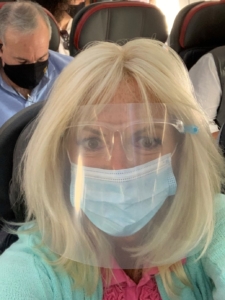 With visa, health forms and passport in hand and a duffel bag packed to the 33 lb. limit per African bush plane load restrictions, I boarded my flight to JFK for an overnight stay at the TWA Hotel. I wore a mask and face shield and the American Airlines flights were full. I brought my wipes and hand sanitizer, but had confidence in American’s new sanitation protocols, which include hospital-grade electrostatic and UV cleaning techniques between flights.
With visa, health forms and passport in hand and a duffel bag packed to the 33 lb. limit per African bush plane load restrictions, I boarded my flight to JFK for an overnight stay at the TWA Hotel. I wore a mask and face shield and the American Airlines flights were full. I brought my wipes and hand sanitizer, but had confidence in American’s new sanitation protocols, which include hospital-grade electrostatic and UV cleaning techniques between flights.
The TWA hotel is an easy choice, connected to JFK at terminal 4 so one never has to leave the airport. It is designed as a kitschy throwback to the golden age of flying and is modern, sleek as a 747, and surprisingly affordable.
Top tip for travelers: Micato Safaris provides you with bush plane baggage allowance of 33 lbs. Packing advice: Three pants, 2 shorts, five T shirts, at least one long sleeved, three jackets/ vests, two pairs shoes, pajamas and swimsuit, small backpack, converter & adapter. If you want to hike, bring one pair of closed toe shoes. If you are not a professional photographer, in addition to using your smart phone for photos, I recommend purchasing a good point and shoot camera with a minimum 25X zoom capability to maximize your photo opportunities. I bought a Canon for $200 at Best Buy and the wildlife pictures I captured could rival those in National Geographic.
Kenya requires a PCR COVID test to be completed with negative results within no more than 96 hours prior to arrival. Tip for travelers: schedule TWO tests. Best to have a back up plan in case test results do not come through in time. I took 1 test at CVS for free and scheduled one test with a private local medical firm guaranteeing 24-hour turnaround for $250. The CVS test came through within 72 hours.
While many countries are now opening for international travel, every country has specific entry requirements, and Kenya is no 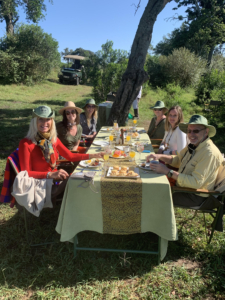 exception. Current travel requirements that are easily navigable with the assistance of your travel advisor include completing online health forms for Kenya and New York, if transiting through. Kenya requires an electronic visa and your travel advisor can provide you with the most current vaccine requirements and recommendations. Recommended vaccines for African travel include a yellow fever shot, which one should pursue early, as these vaccines are limited in availability.
exception. Current travel requirements that are easily navigable with the assistance of your travel advisor include completing online health forms for Kenya and New York, if transiting through. Kenya requires an electronic visa and your travel advisor can provide you with the most current vaccine requirements and recommendations. Recommended vaccines for African travel include a yellow fever shot, which one should pursue early, as these vaccines are limited in availability.
Kenya requires the following, and I recommend printing every document, as travelers are asked to present these documents upon checking in to the international flight:
- Your COVID negative results
- Kenya Health Form QR code
- Your completed health form for the state through which you are connecting
- Your eVisa
Kenya Airways offers direct nonstop flights from JFK to Nairobi. I advise arriving in NYC the day before your flight to ensure that, should there be any flight delays, you do not miss your international leg and the trip of a lifetime. Kenya Airways Dreamliner offers spacious lie-flat seats and amenities that include satin lined blankets and pillows that make a 13.5 hour flight surprisingly comfortable. The African flight crew dressed in what looked like hazmat suits, but the warm smiles underneath their masks and earnest, gentle hospitality were unmistakably gracious. All travelers were required to wear masks the entire flight, except when eating and drinking. We felt very safe and pampered.
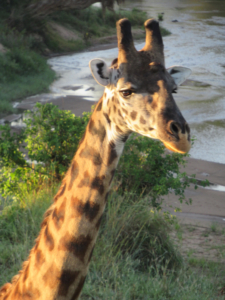 Our first full day in Nairobi included a visit to Giraffe Center, where we fed, pet and kissed the endangered Rothschild giraffes that are being bred and released into the wild. These are the same giraffes that dine at your table through open windows at the iconic Giraffe Manor. Giraffe Manor can be seen from the Center, but if you wish to stay at Giraffe Manor, working with your travel advisor at least 18 months in advance is necessary. Another must-do in Nairobi is a visit to the home of Karen Blixen, author of Out of Africa. Watch the movie before you go and you will see that the film was made on site in her original home in the Karen neighborhood of Nairobi.
Our first full day in Nairobi included a visit to Giraffe Center, where we fed, pet and kissed the endangered Rothschild giraffes that are being bred and released into the wild. These are the same giraffes that dine at your table through open windows at the iconic Giraffe Manor. Giraffe Manor can be seen from the Center, but if you wish to stay at Giraffe Manor, working with your travel advisor at least 18 months in advance is necessary. Another must-do in Nairobi is a visit to the home of Karen Blixen, author of Out of Africa. Watch the movie before you go and you will see that the film was made on site in her original home in the Karen neighborhood of Nairobi.
There is no greater anticipation than that of your very first game drive in the Masai Mara. The quick 40- minute bush flight to our destination was a thrill because the plane flies low enough to easily view elephants, giraffe, zebra and wildebeest on open plains. Masai villages and tribal compounds are distinguishable by their circular boundaries of tall dark sticks, round huts and gated paddies for their cows and goats. The sweet anticipation grows with each animal sighting from the air.
We were greeted on a red dirt runway in the Masai Mara by our safari guide whose name is Kennedy. 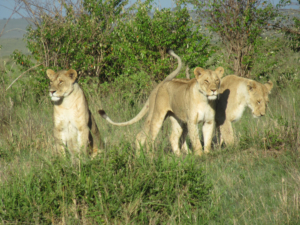 Kennedy wore a Safari uniform, spoke perfect English, has a college education, two daughters and a wife who is a social worker, and he is the Village Chief of his Samburu village of under 300 people. As Chief, he is the governor of all major concerns in his village and is the final judge of all disputes. When he goes to his village, he dons the traditional village attire which is tribal by all standards, down to the cow hide sandals and sarong. His villagers still dwell in primitive dirt floor homes composed of twigs and cow dung. His village does not have running water or electricity. In Kenya, there are only a few villages that have a well. He speaks with authority and punctuates his sentences with an inflection of good humor. We trust immediately that we are in good hands.
Kennedy wore a Safari uniform, spoke perfect English, has a college education, two daughters and a wife who is a social worker, and he is the Village Chief of his Samburu village of under 300 people. As Chief, he is the governor of all major concerns in his village and is the final judge of all disputes. When he goes to his village, he dons the traditional village attire which is tribal by all standards, down to the cow hide sandals and sarong. His villagers still dwell in primitive dirt floor homes composed of twigs and cow dung. His village does not have running water or electricity. In Kenya, there are only a few villages that have a well. He speaks with authority and punctuates his sentences with an inflection of good humor. We trust immediately that we are in good hands.
On a Micato Safari, your Safari Guide is a highly trained, skilled professional who stays with you the entire journey, from one Safari Camp to the next. He tracks the animals, educates us about each breed and their behavior and, almost imperceptibly, gauges what we want to see, experience, eat, drink, senses when we are cold, warm, need massages or yoga, a bonfire or a hot shower. He is a master of reading our needs while at the same time, delivering an unforgettable experience.
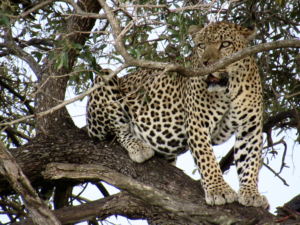 In the Masai Mara, the vehicles are permitted to go “off road” which affords incredible game viewing up close. Our very first game drive in an open-air six-passenger Land Rover landed us underneath a towering Acacia tree where a leopard held court with his fresh kill in the branches. Both the leopard and dead warthog dangled above us as we snapped photos and gaped in awe.
In the Masai Mara, the vehicles are permitted to go “off road” which affords incredible game viewing up close. Our very first game drive in an open-air six-passenger Land Rover landed us underneath a towering Acacia tree where a leopard held court with his fresh kill in the branches. Both the leopard and dead warthog dangled above us as we snapped photos and gaped in awe.
The Masai Mara offers wide open plains and big sky, so it is easy to spot the wildlife wandering freely in their natural habitat. We spotted three female lion, elephants, zebra, cheetah, leopard and giraffe all within the first two hours of landing!
My first reaction to Sand River Camp, the first of three tented Safari Camps on our itinerary, was surprising at how rustic the camp appeared. The primary gathering spot was a canvas tent on a platform in the middle of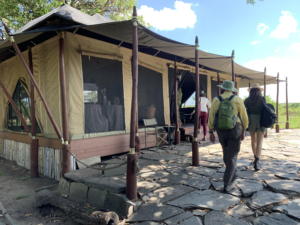 the bush butting up to the Sand River, marking the border between Kenya and Tanzania. Once escorted by a rifle-bearing ranger to my luxury tent accommodations, however, I nearly fell over in surprise at my spectacular luxury tented suite! A sumptuous four poster bed was draped with mosquito netting, and a rich leather Chesterfield, Hemmingway writing desk and huge private bath and outdoor shower were straight out of a movie set. I expected Robert Redford to show upright on cue.
the bush butting up to the Sand River, marking the border between Kenya and Tanzania. Once escorted by a rifle-bearing ranger to my luxury tent accommodations, however, I nearly fell over in surprise at my spectacular luxury tented suite! A sumptuous four poster bed was draped with mosquito netting, and a rich leather Chesterfield, Hemmingway writing desk and huge private bath and outdoor shower were straight out of a movie set. I expected Robert Redford to show upright on cue.
We quickly settled into a routine of early morning game drives, long lunches at the Safari Camp, and late afternoon game drives into dusk, where we were surprised time and time again with astonishing picnic setups in the bush featuring sundowners. Sundowners is “safari-speak” for sunset cocktails al fresco. After our sundowners, we routinely drove back to camp and were treated to three-course dinners featuring fresh farm- to- table cuisine and outstanding South African wines.
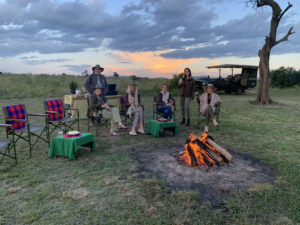 Each exquisite meal was served on white linens and china. Wines and spirits were served in cut crystal glass, and service was five-star, personalized to a level where everyone knew our names and our drink of choice.
Each exquisite meal was served on white linens and china. Wines and spirits were served in cut crystal glass, and service was five-star, personalized to a level where everyone knew our names and our drink of choice.
What can one expect to eat on safari in Kenya? Smoked salmon, wild mushroom soup with truffles, tandoori chicken, grilled lamb, curries, steak, garden salads, fresh local African cheeses, chips, African beers, mouth-watering South African wines, international brands of top shelf spirits, the most unforgettable chai tea you will ever taste and rich, robust Kenyan coffee.
The lavish surprise sundowner celebrations sometimes included hot and cold hors d’oeuvres, a boma fire, free flowing wine, beer and spirits. On all occasions, I found it fascinating that a Masai Warrior was present, watching over us and protecting us from wild animals, should they approach.
The biggest discovery for me this journey was my unquenchable fascination with African tribal culture and specifically the Masai. A 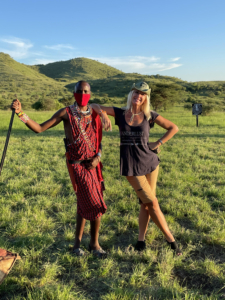 Micato Safari customarily includes a mesmerizing visit to a local Masai village where travelers experience first-hand the Masai culture, including meeting with an elder to learn about their customs and current lifestyles. On our Micato Safari, due to COVID-19 concerns, we did not visit a village, but a Masai Warrior made the journey to our Safari Camp and met with our group of six personally over several hours. The Masai Warrior who called himself Darius wore a sarong and a cape and carried a spear. He was the son of the big Chief. He drank orange Fanta out of a bottle with a straw and spoke gently, at a volume just above the wind. This is what he shared with us:
Micato Safari customarily includes a mesmerizing visit to a local Masai village where travelers experience first-hand the Masai culture, including meeting with an elder to learn about their customs and current lifestyles. On our Micato Safari, due to COVID-19 concerns, we did not visit a village, but a Masai Warrior made the journey to our Safari Camp and met with our group of six personally over several hours. The Masai Warrior who called himself Darius wore a sarong and a cape and carried a spear. He was the son of the big Chief. He drank orange Fanta out of a bottle with a straw and spoke gently, at a volume just above the wind. This is what he shared with us:
Masai villagers maintain a lifestyle where traditions are honored and passed on from generation to generation. Only a few modern families send their children for education outside of the village life. Running water is uncommon. They collect water at the rivers and in cisterns for washing, drinking and cooking. A family’s wealth is measured by the livestock they own, including cows and goats. Marriages are almost always arranged by the parents at a young age, and a bride’s dowry is negotiated by the parents in terms of cows and goats and delivered to the groom’s parents on wedding day. Female circumcision is part of the marital ceremony on wedding morning, and polygamy is common. The Masai Warrior can take as many wives as he can afford. The wives live in separate mud huts they each must build within the same family compound. The family compound is surrounded by a wall of thorn bushes and a round coral is erected in the center to protect the livestock from wild animals.
 Male circumcision is performed in public as a rite of passage on Masai boys between the ages of 15-18 years old and everyone drinks beer to celebrate. It is customary for the Masai Moran, a term used for this life stage of a warrior, to live in the bush with their elders for several months, learning tribal customs and competing in tests of endurance, courage and strength including hunting and killing lions.
Male circumcision is performed in public as a rite of passage on Masai boys between the ages of 15-18 years old and everyone drinks beer to celebrate. It is customary for the Masai Moran, a term used for this life stage of a warrior, to live in the bush with their elders for several months, learning tribal customs and competing in tests of endurance, courage and strength including hunting and killing lions.
Every Masai Moran must spear a lion with a knife in the wild as a rite of passage. The first one to stab the lion is bestowed great honor, and the last to get to the lion is considered a coward. The Masai carry a long spear or a dagger, not rifles, and they wear the traditional Masai sarong and cape, drink the blood of cows for supernatural strength and courage and compete in jumping and singing performances to demonstrate their prowess and athleticism.
While Masai Warriors are protectors of people and livestock, the tribal philosophy is to live in harmony with the wild animals. On one occasion, we were enjoying fireside cocktails under a starlit sky up until a Masai Warrior invited us to leave so that a crocodile could lay its eggs where we were conjugating. That very evening, I was escorted after dinner to my luxury tented suite and my Warrior escort stopped me with a gentle warning and protective gesture to give the right of way to the python crossing our path.
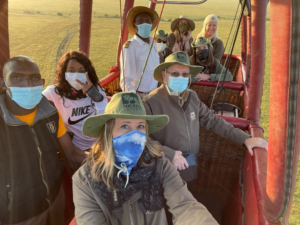 The highlight of my African Safari was a magical hot air balloon flight over the Masai Mara at dawn followed by a decadent champagne breakfast in the wild. Add the unimaginable perspective of flying low over towers of giraffe, zebra, wildebeest and watching them scatter as the flame fires the balloon forward and upwards. This is a magical experience that I highly recommend be purchased well in advance at the time one books a safari with their travel advisor. The balloon ride is limited to 8 guests and also limited by weather conditions, so to reserve well in advance enhances one’s chances of actualizing the dream.
The highlight of my African Safari was a magical hot air balloon flight over the Masai Mara at dawn followed by a decadent champagne breakfast in the wild. Add the unimaginable perspective of flying low over towers of giraffe, zebra, wildebeest and watching them scatter as the flame fires the balloon forward and upwards. This is a magical experience that I highly recommend be purchased well in advance at the time one books a safari with their travel advisor. The balloon ride is limited to 8 guests and also limited by weather conditions, so to reserve well in advance enhances one’s chances of actualizing the dream.
For the full breadth of experience, it is important to visit several camps in different areas of Africa. I travelled on four bush planes to experience three different Safari camps in three different areas of Kenya. Each area features unique topography, different climates due to elevation changes, different animal populations, and an interesting variety of safari camps. For example, in the Masai Mara, because there is a huge population of lions, you will not find a rhino. Rhino is one of the big five, so you definitely want to see rhino! At Lewa 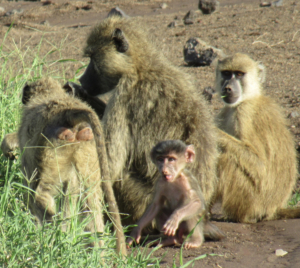 Conservancy, there are hundreds of black and white rhino but less than 25 lions, which is a result of the conservancy effort to preserve the rhino population. In Tsavo National Park, there are many monkeys, baboon and ostrich, but you will not find it easy to spot large herds of elephant crossing the vast plains, for instance, because the topography is hilly with lots of low bushes and trees which makes them hard to spot. Another difference due to location is the climate. The Lewa Conservancy was significantly cooler at night than the Masai Mara due to a higher elevation and proximity to Mt. Kenya.
Conservancy, there are hundreds of black and white rhino but less than 25 lions, which is a result of the conservancy effort to preserve the rhino population. In Tsavo National Park, there are many monkeys, baboon and ostrich, but you will not find it easy to spot large herds of elephant crossing the vast plains, for instance, because the topography is hilly with lots of low bushes and trees which makes them hard to spot. Another difference due to location is the climate. The Lewa Conservancy was significantly cooler at night than the Masai Mara due to a higher elevation and proximity to Mt. Kenya.
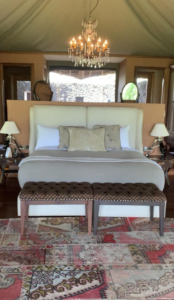 A 60-minute bush plane flight from the Masai Mara is Tsavo National Park, where we checked into the glamorous Finch Hatton’s Camp. Finch Hatton was played by Robert Redford in Out of Africa, and was a real-life character who was the original luxury safari guide back in the 1920s. My tented suite featured a broad outdoor deck with huge lounging pit, and an enormous crystal chandelier hung over my custom upholstered king bed. A copper tub and dual outdoor shower sprawled across the back of my tent. After our game drive the next morning, I lounged on my deck, drank Tusker beer and cracked open my journal. A fat hippo lumbered out of the bush and dumped himself into the pond with a big splash. Monkeys squabbled with each other and avoided making eye contact with me when I stripped and exhaled under my outdoor shower.
A 60-minute bush plane flight from the Masai Mara is Tsavo National Park, where we checked into the glamorous Finch Hatton’s Camp. Finch Hatton was played by Robert Redford in Out of Africa, and was a real-life character who was the original luxury safari guide back in the 1920s. My tented suite featured a broad outdoor deck with huge lounging pit, and an enormous crystal chandelier hung over my custom upholstered king bed. A copper tub and dual outdoor shower sprawled across the back of my tent. After our game drive the next morning, I lounged on my deck, drank Tusker beer and cracked open my journal. A fat hippo lumbered out of the bush and dumped himself into the pond with a big splash. Monkeys squabbled with each other and avoided making eye contact with me when I stripped and exhaled under my outdoor shower.
Finch Hatton’s camp has a spa, yoga platform and two pools. The spa featured a hummum and private massage cabanas. We took full advantage of these amenities one rainy morning in place of a game drive. The massage was a great way to relieve the achy muscles and soreness from bumpy rides in the Safari vehicles.
From Tsavo, we took a 50-minute bush plane flight to Lewa Wildlife Conservancy, where we checked into yet another vastly different 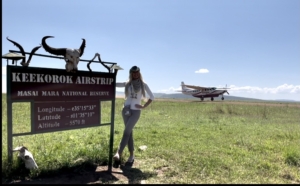 Safari Camp. Here, I truly was camping. My tent was a tent, and I was transported to my Girl Scout camping days in Wisconsin. At Lewa, we had the most amazing wildlife encounters, including coming within 20 yards of a black rhino and her newborn baby rhino; witnessing a Jackal stalking a Cheetah, and an enormous male Lion who showed up for the sunset and stole the show.
Safari Camp. Here, I truly was camping. My tent was a tent, and I was transported to my Girl Scout camping days in Wisconsin. At Lewa, we had the most amazing wildlife encounters, including coming within 20 yards of a black rhino and her newborn baby rhino; witnessing a Jackal stalking a Cheetah, and an enormous male Lion who showed up for the sunset and stole the show.
Trekking through the wild on camel or horse is an exciting option for safari guests, and an experience that really appealed to me. However, there is only a limited number of camel and horse available for safari, and if not reserved far enough in advance, one stands a very limited chance of securing a beast for transportation. We requested this too late. Hot tip: As soon as you reserve your safari, opt in to these special safari options so that you don’t miss out.
Finally, I urge anyone who is truly interested in the animal encounters and gastronomic surprises to not skip out on any one of the two daily game drives. Each is a unique opportunity to observe animals and their behavior in the wild, and each game drive will offer one-time experiences that can never be repeated.
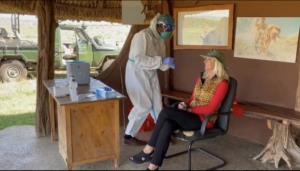 With Covid-19 looming in the air, travel restrictions continue to evolve daily. During our safari, we learned that travelers transiting through New York would require a negative COVID-19 Test. As only travel advisors can do, we arranged to have COVID-19 tests performed by a doctor on a dirt airstrip in the middle of Kenya. Results all came in within 48 hours via email and we were all negative. This, of course was our expectation, because hand sanitizer was distributed like candy at a paradeat every opportunity, and masks were required 100% of the time. We travelled in a bubble and all our domestic flights and transportation were private. The private experiences may cost travelers more money, but we found that the added assurance allowed us to travel safe and live well.
With Covid-19 looming in the air, travel restrictions continue to evolve daily. During our safari, we learned that travelers transiting through New York would require a negative COVID-19 Test. As only travel advisors can do, we arranged to have COVID-19 tests performed by a doctor on a dirt airstrip in the middle of Kenya. Results all came in within 48 hours via email and we were all negative. This, of course was our expectation, because hand sanitizer was distributed like candy at a paradeat every opportunity, and masks were required 100% of the time. We travelled in a bubble and all our domestic flights and transportation were private. The private experiences may cost travelers more money, but we found that the added assurance allowed us to travel safe and live well.
Our Micato Safari experience was punctuated by a final day spent in Nairobi visiting America Share, the philanthropic arm of Micato  Safaris. For every safari sold, Micato Safaris puts one child through school for a year. It is through Micato Safaris and some generous safari guests that a well was built in the middle of a slum neighborhood, followed by a library, a computer lab, a basketball and soccer court, and now a work program for young girls. It was an eye-opening experience after coming from a luxury escape featuring lavish meals and moments such as we had.
Safaris. For every safari sold, Micato Safaris puts one child through school for a year. It is through Micato Safaris and some generous safari guests that a well was built in the middle of a slum neighborhood, followed by a library, a computer lab, a basketball and soccer court, and now a work program for young girls. It was an eye-opening experience after coming from a luxury escape featuring lavish meals and moments such as we had.
Travelling with Micato Safaris will spoil a person. I only realized how spoiled I was when, upon returning home from my safari, the 4:00 hour rolled around, and I asked my baffled husband what he was serving for sundowners. I was disappointed that there was no gift left on my pillow when I turned in for the night. I climbed into bed and was shocked there was no hot water bottle under the covers warming up the sheets. At least I brought Kenyan coffee beans home can brew a bold cup of Kenyan coffee and dream about my return.
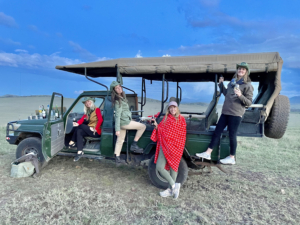 Lisa Spiller is an independent luxury travel advisor with Preferred Travel of Naples. www.PreferredNaples.com
Lisa Spiller is an independent luxury travel advisor with Preferred Travel of Naples. www.PreferredNaples.com
For further information and assistance with travel plans, contact Lisa@PreferredNaples.com or 800.523.3716.

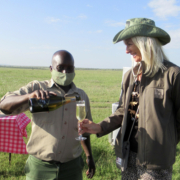
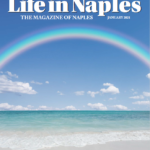
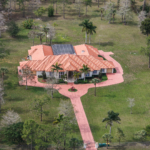
Leave a Reply
Want to join the discussion?Feel free to contribute!